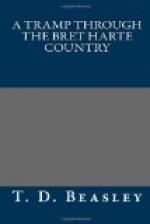Mr. Taylor has a charming home with extensive grounds overlooking the town and surrounding country. In his garden is a spruce he planted himself forty-five years ago, and apple trees of the same age. The spruce now has the appearance of a forest tree and shades the whole front of the house. His present home was built in 1864 and from all appearances should last the century out. He said the lumber was carefully selected, the boards being heavier than usual, and all the important timbers, instead of being nailed, were morticed and dove-tailed. This thoroughness of workmanship accounts for the excellent condition of the wooden buildings in these towns, many of which were constructed over fifty years ago.
Mr. Taylor came to Grass Valley September 22, 1849, and has lived there almost continuously ever since. He crossed the plains one of twenty-five men, the last of his companions dying in 1905. The little band suffered many hardships, having to be constantly on watch for Indians, though he said they were more fearful of the Mormons. They came over the old emigrant trail across the Sierra Nevada. When they reached Grass Valley, their Captain, a man named Broughton, exclaimed: “Boys! here’s the gold; this is good enough for us!” And there they stayed, the twenty-five of them!
Mr. Taylor had frequently met Mark Twain, but never to his knowledge, Bret Harte. In common with other men who had known the Great American Humorist, Mr. Taylor smiled at the bare mention of his name. Twain’s breezy, hail-fellow-well-met manner, combined with his dry humor, insured him a welcome at all the camps; he was a man who would “pass the time of day” and take a friendly drink with any man upon the road. Twain, he told me, and a man with whom he was traveling on one occasion, lost their mules. They tracked them to a creek and concluding the mules had crossed it, Twain said to his companion: “What’s the use of both of us getting wet? I’ll carry you!” The other complying, Twain reached in safety the deepest part of the creek and, purposely or not, dropped him. A man, to play such pranks as this, must be sure of his standing in a primitive community.
Mr. Taylor is known to everyone in Nevada County as “Ben.” His genial manner and kindly nature are apparent at a glance. But while Ben Taylor was on friendly terms with Mark Twain, he was never so intimate with him as with Bayard Taylor, whom, it seems, he much resembled. This accidental likeness, combined with the similarity of names, caused many more or less amusing but embarrassing complications, since they were frequently taken for each other and received each other’s correspondence.
I asked Ben Taylor — he rightly dislikes “Mister,” perhaps the ugliest and most inappropriate word in the English language — if the shootings and hangings which figure so prominently in the stories of the romancers were not exaggerations. He said he certainly was of that opinion. I said: “As a matter of fact, did you ever see a man either shot or hung for a crime?” “I never did,” he replied with emphasis. “But I once came across the bodies of several men who had been strung up for horse-stealing; that, however, was not in Grass Valley.”




